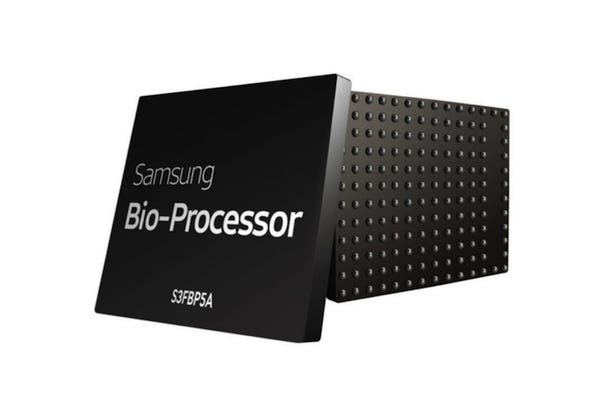January 5, 2016
The electronics giant has announced its plans to compete in the wearables space on two fronts: by continuing to compete head-to-head against other wearables makers while also providing chips to them. We reach out to an impartial industry veteran to get his take on the news.
Brian Buntz

Just before CES kicked off in Las Vegas, the company announced its Bio-Processor chip, which can monitor ECG levels, body fat, skin temperature, galvanic skin response, and heart rate. The Bio-Processor packs microcontroller units, a power management integrated circuit, a digital signal processor, and eFlash memory all onto a single chip. In short, the chip could help wearable device makers boost device performance while curbing power consumption.
We reached out to medtech industry veteran Bill Betten, director of business solutions at Devicix (Minneapolis) to get his thoughts about Samsung's foray into the wearable-device chip market. In the following Q&A, Betten draws on his experience working on semiconductor chips at medical device companies to muse on the potential competitive advantage this would give Samsung as well as the potential challenges it would face in potentially competing against its own customers.
(Note: Bill Betten is speaking on a related subject--on novel uses of sensors to improve healthcare-- at MD&M West, held February 9-11, in Anaheim. His session is titled "A Conversation: Using Sensors to Reduce the Cost of Care While Delivering Improved Quality of Life.")
Qmed: Why do you think Samsung is making a chip for other wearable device companies?
 Bill Betten: I don't have any special information directly related to Samsung's strategy. However, based on my experience working on semiconductor chips at a products company, I can comment on observations based on experience. Samsung is a huge company with many divisions that operate semi-autonomously. As such, they have their own financial and marketing targets to hit and so it would not be unusual to build a chip that can be sold on a broader basis. In fact, given the cost of development, it is almost mandatory to obtain as large a volume as possible to justify the investment. In fact, it is not unusual for companies that begin as a commodity supplier (chips, for example) to want to move into a higher "value add" product by moving to a more integrated product.
Bill Betten: I don't have any special information directly related to Samsung's strategy. However, based on my experience working on semiconductor chips at a products company, I can comment on observations based on experience. Samsung is a huge company with many divisions that operate semi-autonomously. As such, they have their own financial and marketing targets to hit and so it would not be unusual to build a chip that can be sold on a broader basis. In fact, given the cost of development, it is almost mandatory to obtain as large a volume as possible to justify the investment. In fact, it is not unusual for companies that begin as a commodity supplier (chips, for example) to want to move into a higher "value add" product by moving to a more integrated product.
The challenge is when you compete with your own customers, it is important to maintain a separation between the divisions to prevent conflict. An advantage for Samsung would be early access to the chip as well as a much more intimate knowledge of the product should permit earlier and arguably better product realizations.
In addition, you can also regard the chip as the skeleton of the product. It is the algorithms and software that turn the chipset into a viable product. You can see similar examples of this of course in other fields, Microsoft for example building computers.
Qmed: What do you think the regulatory hurdles might be for companies looking to make "medical-grade" or at least more-sophisticated wearables that track more sophisticated health metrics? Apple is rumored to have scaled back its
Betten: There is no doubt that there will be regulatory hurdles to overcome if the final product is to be used for regulated medical purposes. However, this is really no different for the Samsung as a chip provider than it is for any other provider. For example, when I was at Nonin Medical leading the engineering group in the development of pulse oximeters, we used Freescale microprocessors to provide the brain of the units and we'd buy commercially available LEDs for the transmitters. By themselves, these parts aren't regulated, but when we put them together into a final product with an intended use of providing SpO2 measurements for diagnostic purposes, the product has to go through all of the clinical and regulatory effort to show that it is effective for that use.
The companies that do the design and integration into the product have the responsibility to ensure that the product is fit for that use. For example, reliable and medically relevant heart rate and SpO2 measurements are virtually impossible to pick up off the wrist due to physiological issues as well as user issues (fit, location, etc.).
Qmed: What kind of devices to you foresee using Samsung's Bio Processor?
Betten: To build on what I said earlier, the challenge for the companies using the Bio Processor will be in the execution of the final product. They will need the documentation to create the design history file, the testing to confirm the performance, and finally the market positioning and support infrastructure for medical products. For example, if a medical product is returned, the company must consider the fact that it might need to be sterilized before it could be taken back for testing.
The barrier to making more relevant devices is not technological, it is indeed regulatory and financial. In the medical world that typically means reimbursement. In the health and wellness space, it means paying your own money for a product that might be of questionable value.
In addition, the real question becomes what provides real medical value. The AliveCor ECG is an approved product, yet most users aren't able to do anything with the information without additional interpretation by a trained professional. An activity monitor that gets you up and moving is useful, yet many of them gather dust shortly after being purchased. The real key is coming up with an instrument that can provide meaningful and useful information. A blood glucose meter probably still remains as the best example of a very useful portable device.
Brush up on the latest on preventing device failures at MD&M West, February 9-11 at the Anaheim Convention Center in Anaheim, CA. |
Brian Buntz is the editor-in-chief of MPMN and Qmed. Follow him on Twitter at @brian_buntz.
Like what you're reading? Subscribe to our daily e-newsletter.
About the Author(s)
You May Also Like


